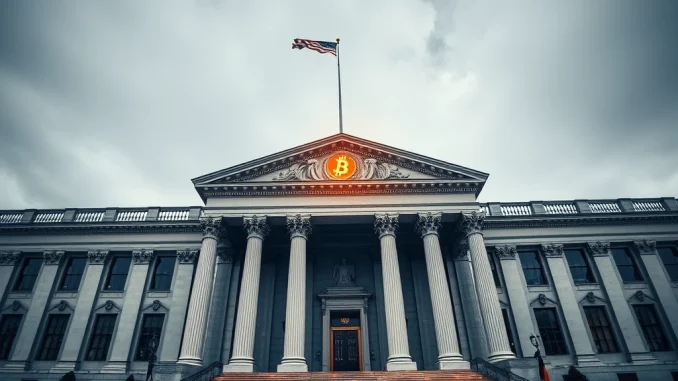
Get ready for a potentially seismic shift in the crypto landscape! All eyes are on April 5th as the U.S. Treasury is expected to pull back the curtain and disclose its cryptocurrency holdings. For crypto enthusiasts and market watchers alike, this is not just another date on the calendar – it’s a moment that could redefine how governments perceive and interact with digital assets. Are you prepared for the shocking truth about the U.S. government’s foray into the world of Bitcoin and beyond?
Decoding the Impending Crypto Disclosure: What to Expect on April 5th?
According to Crypto Briefing, April 5th is the date circled for the U.S. Department of the Treasury, along with other federal agencies, to publicly reveal their crypto disclosure. This monumental announcement is anticipated to shed light on the extent to which the U.S. government has embraced digital currencies. While Bitcoin (BTC) is almost certainly on the list, the burning question is: what other cryptocurrencies are nestled within the government’s digital vaults?
Here’s what’s currently on the radar for potential inclusion in the disclosure:
- Bitcoin (BTC): As the flagship cryptocurrency, Bitcoin is widely expected to be a significant part of any government crypto portfolio. Its adoption by institutions and corporations has paved the way for potential governmental interest.
- Altcoins – The Big Question Mark: The crypto community is buzzing with speculation about whether other cryptocurrencies will be disclosed. The mention of Ripple (XRP), Solana (SOL), and Cardano (ADA) adds an intriguing layer to this anticipation, especially given former President Trump’s past remarks on these assets.
- Scope of Holdings: Beyond just listing the types of cryptocurrencies, the disclosure could potentially reveal the quantity of each asset held. This level of transparency would provide unprecedented insight into the scale of the government’s involvement in the digital asset space.
Why is the U.S. Treasury Crypto Holdings Disclosure a Big Deal?
This isn’t just about numbers on a spreadsheet; the US Treasury crypto holdings disclosure carries significant weight for several reasons:
- Market Validation: A substantial government holding of cryptocurrencies, especially Bitcoin, could be interpreted as a powerful validation of digital assets as a legitimate asset class. This could boost investor confidence and potentially attract further institutional investment.
- Regulatory Implications: Understanding the government’s own crypto holdings might offer clues into future regulatory approaches. It could signal a move towards greater acceptance and integration of cryptocurrencies within the traditional financial system.
- Transparency and Accountability: Public disclosure of government assets promotes transparency and accountability. It allows citizens and the market to understand how taxpayer money is being managed in the context of emerging technologies.
- Setting a Global Precedent: As a leading global economy, the U.S.’s stance on cryptocurrency significantly influences international perceptions and policies. This disclosure could encourage other nations to consider or reveal their own digital asset strategies.
Could Ripple (XRP), Solana (SOL), and Cardano (ADA) Be Part of the Government’s Crypto Reserve?
The inclusion of Ripple (XRP), Solana (SOL), and Cardano (ADA) in the government crypto reserve is a point of intense speculation. Former President Trump’s previous comments about these assets have fueled this curiosity. While Bitcoin’s decentralized nature and established track record make it a likely candidate, the rationale for including altcoins like XRP, SOL, and ADA is less clear-cut. Here’s a breakdown of why these altcoins are in the spotlight:
| Cryptocurrency | Key Features | Potential Relevance to Government Holdings |
|---|---|---|
| Ripple (XRP) | Focus on payment solutions, faster and cheaper transactions, partnerships with financial institutions. | Potential interest in utilizing XRP for cross-border payments or modernizing financial infrastructure. However, ongoing regulatory uncertainties surrounding XRP might be a deterrent. |
| Solana (SOL) | High-speed blockchain, low transaction fees, scalable for decentralized applications (dApps). | Could be attractive for its efficiency and scalability, potentially for government applications requiring high throughput and low cost. |
| Cardano (ADA) | Research-driven blockchain, emphasis on security and sustainability, smart contract capabilities. | Its focus on security and formal verification processes might appeal to government agencies prioritizing robust and reliable blockchain solutions. |

Benefits and Challenges of Government Crypto Holdings
The idea of governments holding cryptocurrencies presents both exciting opportunities and considerable challenges. Let’s delve into some key aspects:
Benefits:
- Diversification of National Reserves: Cryptocurrencies, particularly Bitcoin, can act as a non-correlated asset, potentially diversifying national reserves and hedging against inflation or traditional market volatility.
- Technological Advancement: Embracing crypto can position governments at the forefront of technological innovation, fostering expertise in blockchain technology and digital finance.
- Modernizing Financial Systems: Cryptocurrencies and blockchain technology can be leveraged to modernize payment systems, improve efficiency, and reduce costs in government operations.
- Economic Opportunities: Government involvement could stimulate growth in the domestic crypto industry, creating jobs and attracting investment.
Challenges:
- Volatility and Risk Management: The inherent volatility of the crypto market poses significant risk management challenges for government treasuries accustomed to stable asset classes.
- Security Concerns: Safeguarding large cryptocurrency holdings from hacking and theft requires robust security infrastructure and expertise.
- Regulatory Uncertainty: The evolving regulatory landscape for cryptocurrencies creates uncertainty and complexity for government agencies navigating this space.
- Public Perception and Political Scrutiny: Government investment in crypto could face public skepticism and political opposition due to its perceived risks and speculative nature.
Actionable Insights: Preparing for the April 5th Crypto News
Whether you are a seasoned crypto investor, a financial professional, or simply curious about the future of digital assets, the April 5 crypto news from the U.S. Treasury is something you need to watch closely. Here are some actionable insights to consider:
- Stay Informed: Keep an eye on reputable crypto news sources and official announcements leading up to and following April 5th.
- Market Volatility: Be prepared for potential market volatility around the disclosure date. News, whether positive or negative, can trigger price fluctuations.
- Long-Term Perspective: Consider the long-term implications of government crypto adoption. This disclosure could be a pivotal moment in the mainstream integration of digital assets.
- Diversification Strategy: For investors, this news underscores the importance of portfolio diversification and understanding the evolving role of cryptocurrencies in the global financial system.
Conclusion: A Pivotal Moment for Government Crypto Adoption
The U.S. Treasury’s expected disclosure of its Bitcoin holdings and potentially other cryptocurrencies on April 5th is more than just a routine announcement. It’s a potentially groundbreaking event that could signal a significant shift in the global acceptance and integration of digital assets. By revealing their crypto footprint, the U.S. government could be setting a powerful precedent, influencing policy, market sentiment, and the future trajectory of the cryptocurrency revolution. Buckle up, because April 5th could be the day the crypto narrative takes another significant leap forward.



